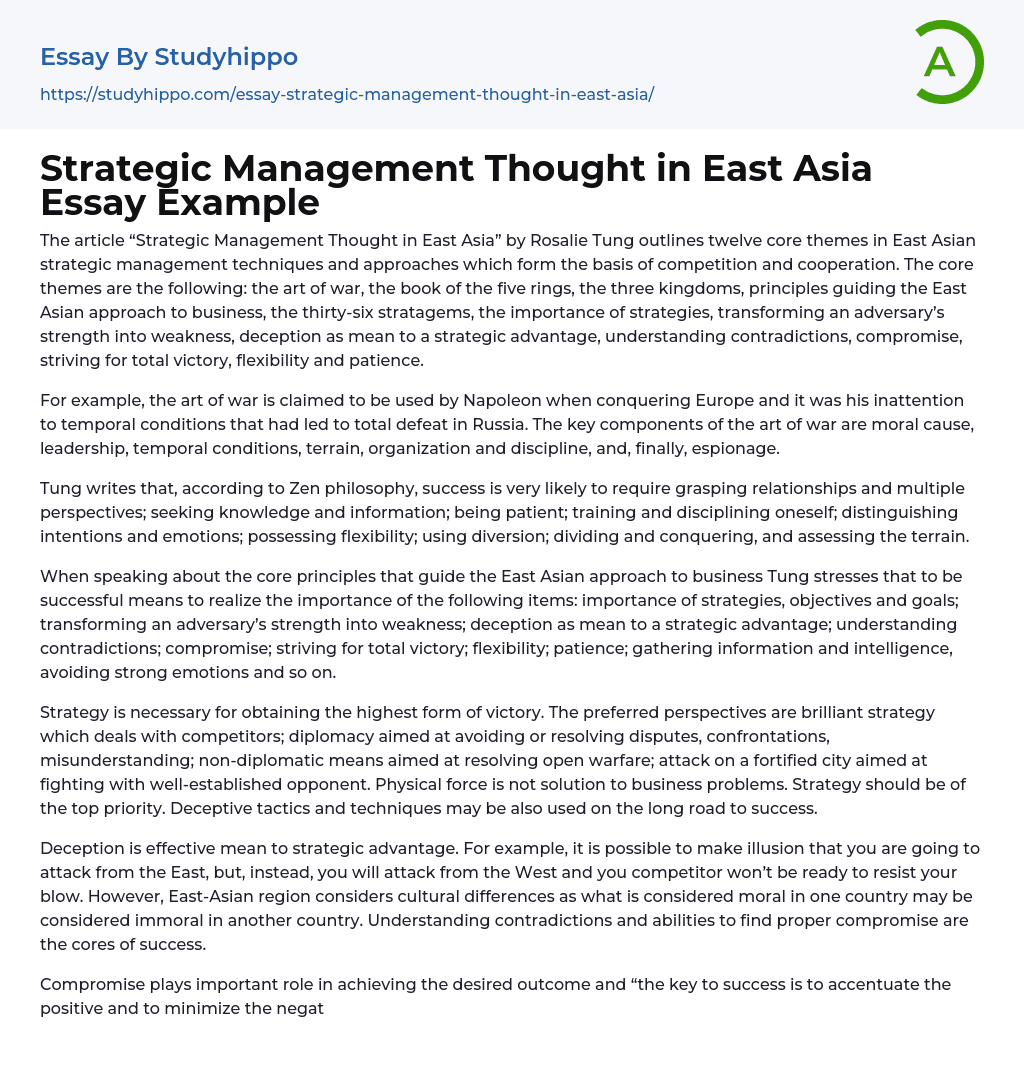The article “Strategic Management Thought in East Asia” by Rosalie Tung outlines twelve core themes in East Asian strategic management techniques and approaches which form the basis of competition and cooperation. The core themes are the following: the art of war, the book of the five rings, the three kingdoms, principles guiding the East Asian approach to business, the thirty-six stratagems, the importance of strategies, transforming an adversary’s strength into weakness, deception as mean to a strategic advantage, understanding contradictions, compromise, striving for total victory, flexibility and patience.
For example, the art of war is claimed to be used by Napoleon when conquering Europe and it was his inattention to temporal conditions that had led to total defeat in Russia. The key components of the art of war are moral cause, leadership, temporal conditions, terrain, organization and discipline, and, finally, espionage.
Tung writes that, according to Zen philosophy, succ
...ess is very likely to require grasping relationships and multiple perspectives; seeking knowledge and information; being patient; training and disciplining oneself; distinguishing intentions and emotions; possessing flexibility; using diversion; dividing and conquering, and assessing the terrain.
When speaking about the core principles that guide the East Asian approach to business Tung stresses that to be successful means to realize the importance of the following items: importance of strategies, objectives and goals; transforming an adversary’s strength into weakness; deception as mean to a strategic advantage; understanding contradictions; compromise; striving for total victory; flexibility; patience; gathering information and intelligence, avoiding strong emotions and so on.
Strategy is necessary for obtaining the highest form of victory. The preferred perspectives are brilliant strategy which deals with competitors; diplomacy aimed at avoiding or resolving disputes, confrontations,
misunderstanding; non-diplomatic means aimed at resolving open warfare; attack on a fortified city aimed at fighting with well-established opponent. Physical force is not solution to business problems. Strategy should be of the top priority. Deceptive tactics and techniques may be also used on the long road to success.
Deception is effective mean to strategic advantage. For example, it is possible to make illusion that you are going to attack from the East, but, instead, you will attack from the West and you competitor won’t be ready to resist your blow. However, East-Asian region considers cultural differences as what is considered moral in one country may be considered immoral in another country. Understanding contradictions and abilities to find proper compromise are the cores of success.
Compromise plays important role in achieving the desired outcome and “the key to success is to accentuate the positive and to minimize the negative”. (p. 61) Gathering information and intelligence is necessary for contaminating and frustrating competitor’s advantage. For example, it is possible to gather information through entering into allies with partners, local nationals, etc. knowledge about key players should be gathered as well. Patience is among the reasons why East Asian pace is slower than Western pace of life and doing business.
Importance of patience is different in different countries and Koreans, for example, make quicker decisions than Chinese and Japanese people. Patience is required in East Asian region as time is necessary for establishing strong and reliable relationships. Summing up, when doing business East Asian usually refer to philosophy, but they may interpret it differently, nevertheless, success depends on many factors, attributes and perspectives.
- Leadership and Management essays
- Change Management essays
- Project Management essays
- Knowledge Management essays
- Operations Management essays
- Quality Management essays
- Risk Management essays
- Scientific Management essays
- supply chain management essays
- Performance Management essays
- Time Management essays
- Brand Management essays
- Total Quality Management essays
- Risk essays
- Manager essays
- Leadership essays
- Business Ethics essays
- Board Of Directors essays
- Product Management essays
- Comparative Analysis essays
- Decision Making essays
- Dispute Resolution essays
- Stress Management essays
- Business Management essays
- Brand Equity essays
- Branding essays
- Nike, Inc. essays
- Market share essays
- Razor essays
- Being A Leader essays
- Servant Leadership essays
- Leadership Experience essays
- Leadership Qualities essays
- Incentive essays
- Adult essays
- Aggression essays
- Altruism essays
- Archetype essays
- Behavior essays
- Certainty essays
- Conformity essays
- Deception essays
- Human Behavior essays
- Human Sexuality essays
- Maturity essays
- Morality essays
- Obedience essays
- Procrastination essays
- Reinforcement essays
- Role Model essays




